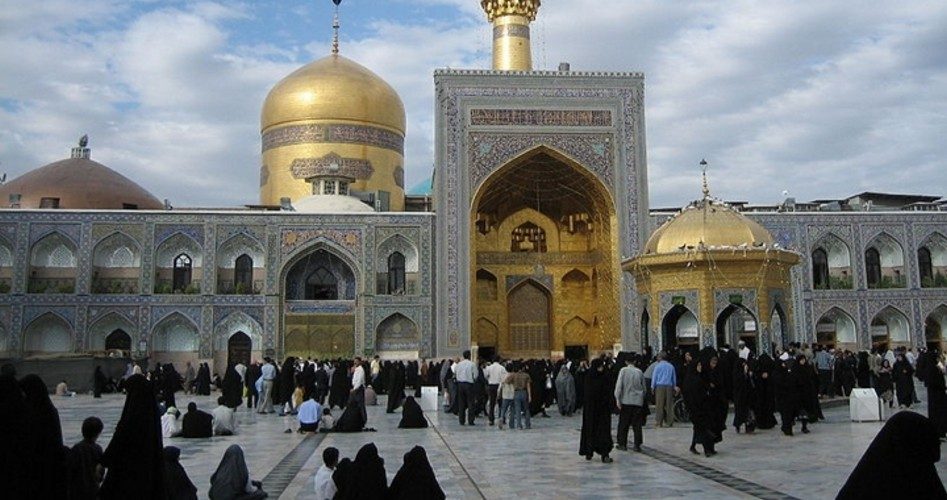
A 32-year-old Iranian who is a U.S. citizen and a Christian pastor is being held in prison in Iran, and is expected to face charges for rejecting Islam and preaching the gospel in his native country. Fox News reported that in September the Rev. Saeed Abedini, who lives in the United States with his American wife and two young children, “was making one of his frequent visits to see his parents and the rest of his family in Iran, his country of origin and where he spent many years as a Christian leader and community organizer developing Iran’s underground home church communities for Christian converts.”
According to Abedini’s wife, Naghmeh, on September 26 a group of men burst into his parents’ home in Tehran, where Abedini was staying, hauling him off to jail and placing his parents and other family members under house arrest. Thus far Iranian authorities have been mum on Abedini’s plight, but his wife said he has been confined to Evin Prison, which has a reputation for extreme brutality, and his life has been threatened.
“When he became a Christian, he became a criminal in his own country,” Naghmeh told Fox News. “His passion was to reach the people of Iran. He comes from a very close-knit family, and he loved evangelizing and passing out Bibles on the streets of Tehran. This was his passion.”
Naghmeh, who married Abedini in 2005 after making a trip to Iran, said that her husband became a Christian after training with a radical Muslim group to become a suicide bomber. She said that Abedini became very depressed as a result of the intense training and that “Christianity saved his life.”
Abedini ultimately became a leader in Iran’s underground church, and before leaving the country, oversaw about 100 churches and 2,000 members in 30 Iranian cities. Naghmeh said her husband’s role as a Christian leader drew the ire of Muslim authorities in the country. “They see the underground churches as a threat and they see Christianity as a tool from the West to undermine them,” she told Fox. “They think if the country becomes more Christian, they are no longer under Islamic authority. That’s why it’s a threat.”
All non-Muslim religions face persecution in Iran, but Christians have drawn particular focus, in part because of the faith’s connections with the West and the United States. “Under Shariah, or Islamic law, a Muslim who converts to Christianity is on a par with someone waging war against Islam,” noted Fox. “Death sentences for such individuals are prescribed by fatwas, or legal decrees, and reinforced by Iran’s constitution, which allows judges to rely on fatwas for determining charges and sentencing on crimes not addressed in the Iranian penal code.”
Earlier this year, Iranian pastor Youcef Nadarkhani was freed after spending three years in an Iranian prison for trying to convert Muslims to his faith. For several months religious authorities in the country had threatened to execute Nadarkhani unless he renounced his faith — something he steadfastly refused to do.
While as yet Abedini has not been charged with a crime, Iranian officials have told the U.S. citizen and pastor that he will faces charges of threatening Iran’s national security and espionage, because of his involvement with the underground churches.
Abedini’s attorneys said that since 2009 he has made a total of nine trips to Iran. On the first trip back to Iran with his wife and children, Abedini was detained at the airport in Tehran as he and his family were preparing to return to the United States. While his family was permitted to leave the country, Abedini was imprisoned, interrogated, and threatened with execution before Iranian authorities released him, “but only after he signed a written agreement in which the government would not charge him for his Christian activities, and he would be allowed to enter and exit the country so long as he ceased all official house church activities,” reported Fox News. Abedini agreed, and since then has focused on humanitarian efforts, which include plans for a non-sectarian orphanage in the country.
While Abedini has honored his part of the agreement, his attorneys say Iranian authorities reneged on their end of the deal when they took him into custody in September. “You have a situation of arbitrary detention here,” said Tiffany Barrans of the American Center for Law and Justice (ACLJ), a conservative legal advocacy group that has stepped in to try to win Abedini’s release. “Iran is violating its own constitution and its international obligation…. Iran needs to be exposed for its violation of these laws.”
The ACLJ was instrumental in the release of Youcef Nadarkhani through diplomatic channels and for a global media offensive that exposed Iran’s brutal treatment of Christians. The group hopes to use the same strategy to secure the release of Abedini.
In a statement on its website, ACLJ explained that “Iran targets Christians because they present perhaps the greatest threat to the regime — the threat of a different, and radically better, belief system than the fundamentalist, Islamist theocracy that currently dominates the country. As history has proven again and again, it is the better idea that ultimately triumphs over totalitarianism.”
ACLJ said the situation with Abedini demonstrates that Iran “will target Christians even when they are American citizens, and even when they comply with the regime’s demands. Not even charitable efforts are safe.”
On December 20 CBS News reported that the U.S. State Department has said it is aware of the situation, but would give no statement on what it is doing to secure Abedini’s release.
In a December 19 press release the ACLJ’s Jordan Sekulow said: “We know that the Iranian government is sensitive to international pressure. We have seen that in the Pastor Youcef case. Now we have an Iranian-born Christian, who holds a U.S. passport, being punished for his beliefs. Pastor Saeed’s alleged crime: converting to Christianity and proclaiming his Christian faith.”
Meanwhile, Abedini’s wife said that it is a very hard time for her and the couple’s family. “During this season of our Savior’s birth, our family — including our two young children — cannot help but feel a huge gap in our midst,” she said. “Memories of years past tear at our hearts as we desperately pray for Saeed to come home.”



